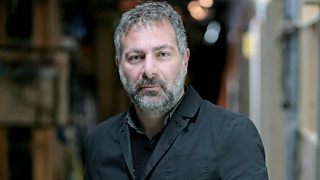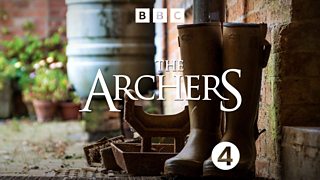Sally Wainwright: Nine things we learned from her interview on This Cultural Life
Sally Wainwright is one of the greatest writers of modern British TV. After cutting her teeth on cultural institutions The Archers and Coronation Street, she went on to write the incredibly successful trio of TV’s Last Tango In Halifax, Gentleman Jack and Happy Valley. She’s won four BAFTAs for her work and was made an OBE in 2020. In a revealing interview for This Cultural Life, Wainwright tells John Wilson all about the shows that drove her love of writing, the influence of her mum, and her time as a bus driver. Here are nine things we learned.

1. Sally's interest in TV came from her mum
Growing up in the Calder Valley, in the Yorkshire Dales, Wainwright says she was “obsessed with TV at quite an early age and knew quite early on that I wanted to work in telly”. Her love of television came from her mum, who she calls “a passionate TV watcher… She really engaged with it and talked about it and discussed characters and where the story was going.” Her mum also gave her a love of storytelling, even if she didn’t realise it at the time. Every Friday, they would go to the pub as a family. “It went on over years that our Friday nights were spent talking about family history and stories,” she says. “It made the past seem so vivid. The wealth of anecdotes she had. I was just properly fascinated by it all.”

2. She wasn’t much of a reader
Despite her love of stories, Wainwright says she was the only one in the family who didn’t really enjoy reading. “I always thought that I should be, because [the rest of the family] were,” she says. She tried desperately to be interested. “I would look at them, but I never actually read massively. I now think I’m a bit dyslexic. I couldn’t get beyond the first page with things. It was a processing problem.” That lack of engagement with books, however, became a sort of blessing. “I think that’s why I ended up inventing my own stories,” she says. “I knew stories were important.”
3. Rock Follies made her realise she was going to write TV
There were several TV and radio shows that were important to Wainwright as a child, most notably The Archers and Coronation Street, because they were her mum’s favourites. But the one that made the biggest impression was Rock Follies, a late ’70s TV show about a trio of women who form a rock band. “It was huge for me,” she says. “It just transported me. I remember being absolutely mesmerised.” She watched it when she was about 14 and loved that it showed women written in a way she hadn’t seen before: “They were properly ballsy. I hadn’t seen women dramatised [like that]. It was how I felt!” It was a pivotal moment. “I remember leaving the room after I’d watched it and thinking, ‘That’s what I’m going to do. I’m going to write telly. I’m going to write programmes like that.’”
4. She used to be a bus driver
After university, Wainwright moved to London to make her writing dreams come true. But she would have to wait a while. While she looked for her first writing job, she became a bus driver. “It allowed me lots of free time to read,” she says. By this point she had developed more of a love of reading. “I remember reading things like the complete works of Chekhov or Ibsen while I was driving buses. I’d sit in the canteen reading.” That wasn’t the only advantage. “I got to know London fairly well. At least some parts. My husband always used to joke that I only know my way around London if I am on a bus route. Which is probably true.”
5. She brought crime to The Archers
Wainwright’s first big writing job was on The Archers, the long-running radio series. She was one of the youngest people to work on the show at the time. “I did wonder if I’d been brought in because they wanted some younger blood,” she says. One of the things she brought to the series was crime. “There was a hold-up in the shop, which I wrote,” she remembers. “It was great. I think I was 24, 25 when I started writing for The Archers. To be able to be living at that age as a writer, it was a real privilege… I learned a lot of discipline. I learned about deadlines and started to learn about structure and developing stories.”

6. Coronation Street taught her how to construct story
Story is the hardest thing in the world... coming up with really clever, good, detailed stories that are new.Sally Wainwright
In about 1990, Wainwright started working for Granada, the TV company behind, among other things, Coronation Street. Here she worked with people who would go on to become some of the biggest writers in British TV, including Russell T. Davies (Doctor Who), Paul Abbott (Shameless) and Kay Mellor (Band of Gold). She began writing for Corrie. “At the time, Coronation Street was huge,” she says. “It was extraordinary. Among writers it was the show that everybody aspired to write.” After her five years on the show, she said she’d learned invaluable lessons about storytelling. “It’s a particular thing coming up with stories for soaps,” she says. “It just goes on and on and on. It’s not like a film, which is relatively easy, I imagine. A storyline for film is finite… Story is the hardest thing in the world. It’s the hardest part of the job, coming up with really clever, good, detailed stories that are new.”
7. Last Tango In Halifax is based on her mother
After Coronation Street, Wainwright began to write on her own. Her first hit was At Home With The Braithwaites, which was seen by nine million viewers. “That was a double-edged thing,” she says. “Because it was my first big 9 o’clock show, I assumed it was always going to be like that.” In 2012 came one of her most personal projects: Last Tango In Halifax, about two widowed people in their 70s who start a relationship. The story is based on Wainwright’s mother and a new romance she started in her 70s, after Wainwright’s father died. “She was fine about it,” she says of using her mother as inspiration. “She didn’t like some of the other stories that went on. I had to explain to her that I had to make some things up… I always ran the scripts past her.” Her mother was her biggest supporter for a long time, and Wainwright says she wrote everything for her. Sadly, she died a few months before this interview. “She developed dementia about six years ago,” says Wainwright. “So I haven’t been able to write for her for quite a long time now. I miss her responses to what I’ve written.”
8. She’s delighted Gentleman Jack made Anne Lister famous

Anne Lister was a landowner in the 19th century. A lesbian who had many relationships with women, she was a proudly gay person in the days when that was a very rare thing. Few people knew this until Wainwright wrote Gentleman Jack, her show about Lister. She first became aware of Lister when, as a child, she visited Shipton Hall, Lister’s old home in Halifax. Lister was barely mentioned at the hall, aside from a portrait. Her diaries of her relationships were hidden away for years. “Slowly, by osmosis, I gathered that this really interesting woman had owned this place, but people just didn’t talk about her,” says Wainwright. “It was really hard to get any information about her… That in itself was intriguing.” After the success of the series, Lister became much better known – there’s even an Anne Lister Society now – which Wainwright is thrilled about. “I’m pleased that so many people all around the world now know about Anne Lister,” she says.
9. She found her success overwhelming
The biggest hit of Wainwright’s career so far has been the police drama Happy Valley, about the long-running battle between a police detective and the criminal she blames for the death of her daughter. She says she wrote the character of Catherine Cawood, played by Sarah Lancashire, as “someone who I kind of want to be like… a fabulous woman who I think is ace.” Happy Valley was a huge hit, as were Last Tango In Halifax and Gentleman Jack. Having three hit series on the go at the same time was, says Wainwright, “overwhelming… You end up on a conveyor belt and you can’t see where you’re ever going to get off it.” All three have now ended and given Wainwright, “time off for the first time in 20 years. I’ve really enjoyed it. That’s been quite an eye-opener, to have that kind of freedom to think, ‘I’m going to get back on the conveyor belt when I’m ready.’” She is now working on something new, but we’ll have to wait to find out what it is.
More from BBC Radio 4
-
![]()
This Cultural Life: Sally Wainwright
TV writer and director Sally Wainwright talks to John Wilson about her formative cultural influences.
-
![]()
Margaret Atwood: Nine things we learned from her This Cultural Life interview
The Handmaid's Tale author talks about her fascination with dictators.
-
![]()
Jed Mercurio: Nine things we learned from his This Cultural Life interview
The TV writer on Line of Duty, being a doctor and flying planes.
-
![]()
The Archers
An intense and gripping week of events unfolds in Ambridge. Listen to all the drama here.





